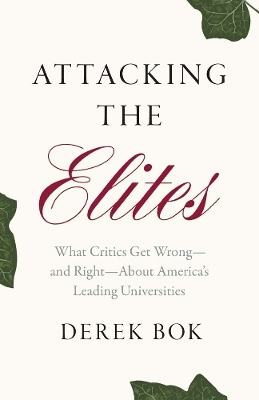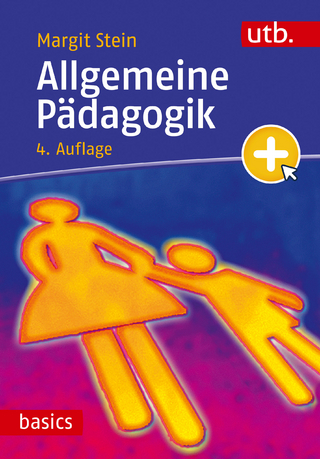
Attacking the Elites
What Critics Get Wrong—and Right—About America’s Leading Universities
Seiten
2024
Yale University Press (Verlag)
978-0-300-27360-1 (ISBN)
Yale University Press (Verlag)
978-0-300-27360-1 (ISBN)
A former Harvard president reflects on how elite universities are responding to critiques from the left and the right, and how they can do better
“People have lost faith, trust and confidence [in higher education]. Anyone wanting to understand why even the best American universities are in such a state will learn a lot by reading [these] reflections.”—Leslie Lenkowsky, Wall Street Journal
Elite American universities, such as Yale, Harvard, and Princeton, are admired throughout the world. They attract highly qualified applicants, and most of their graduates go on to lead successful lives. Scholars and researchers at elite universities contribute to knowledge that benefits the public in countless ways, from the discovery of ancient texts to breakthroughs at the forefront of medical technology.
These same elite institutions, however, are beset by criticism from both sides of America’s ideological divide. Liberals press them to enroll more low-income students and to use their reputations and endowments to induce corporations to adopt more just, equitable, and environmentally sound policies. Conservative politicians accuse the universities’ predominantly liberal faculty of indoctrinating students. The Supreme Court has recently prohibited universities from giving preference to Black and Hispanic applicants for admission, sparking a wider debate over the policies of elite universities in choosing their student body.
Drawing on over fifty years of experience as a student, professor, dean, and president of Harvard University, Derek Bok examines the current disputes involving admissions, diversity, academic freedom and political correctness, curriculum and teaching, and even athletics in order to determine which complaints are unsubstantiated, which are valid, and how elite universities can best respond to their critics.
“People have lost faith, trust and confidence [in higher education]. Anyone wanting to understand why even the best American universities are in such a state will learn a lot by reading [these] reflections.”—Leslie Lenkowsky, Wall Street Journal
Elite American universities, such as Yale, Harvard, and Princeton, are admired throughout the world. They attract highly qualified applicants, and most of their graduates go on to lead successful lives. Scholars and researchers at elite universities contribute to knowledge that benefits the public in countless ways, from the discovery of ancient texts to breakthroughs at the forefront of medical technology.
These same elite institutions, however, are beset by criticism from both sides of America’s ideological divide. Liberals press them to enroll more low-income students and to use their reputations and endowments to induce corporations to adopt more just, equitable, and environmentally sound policies. Conservative politicians accuse the universities’ predominantly liberal faculty of indoctrinating students. The Supreme Court has recently prohibited universities from giving preference to Black and Hispanic applicants for admission, sparking a wider debate over the policies of elite universities in choosing their student body.
Drawing on over fifty years of experience as a student, professor, dean, and president of Harvard University, Derek Bok examines the current disputes involving admissions, diversity, academic freedom and political correctness, curriculum and teaching, and even athletics in order to determine which complaints are unsubstantiated, which are valid, and how elite universities can best respond to their critics.
Derek Bok was president of Harvard University from 1971 to 1991, and again in 2006 and 2007. He is the author of numerous books, including Higher Education in America. He lives in Cambridge, MA.
| Erscheinungsdatum | 06.02.2024 |
|---|---|
| Sprache | englisch |
| Maße | 140 x 216 mm |
| Themenwelt | Sozialwissenschaften ► Pädagogik ► Allgemeines / Lexika |
| Sozialwissenschaften ► Pädagogik ► Erwachsenenbildung | |
| Sozialwissenschaften ► Soziologie ► Makrosoziologie | |
| ISBN-10 | 0-300-27360-6 / 0300273606 |
| ISBN-13 | 978-0-300-27360-1 / 9780300273601 |
| Zustand | Neuware |
| Informationen gemäß Produktsicherheitsverordnung (GPSR) | |
| Haben Sie eine Frage zum Produkt? |
Mehr entdecken
aus dem Bereich
aus dem Bereich
Einführung in die Theorie transformatorischer Bildungsprozesse
Buch | Softcover (2023)
Kohlhammer (Verlag)
CHF 47,60


